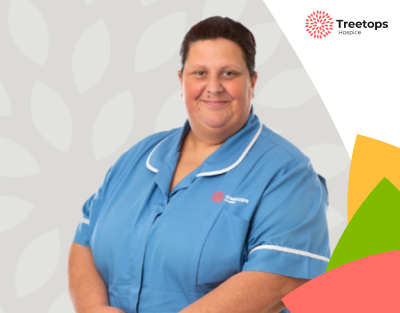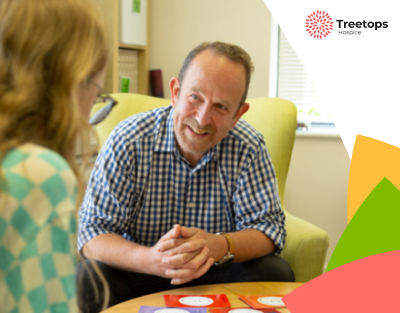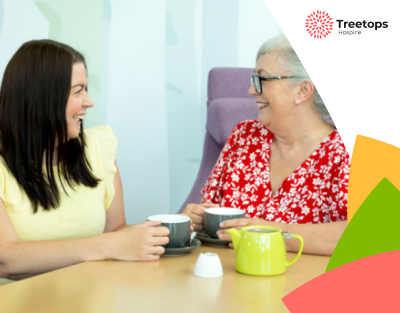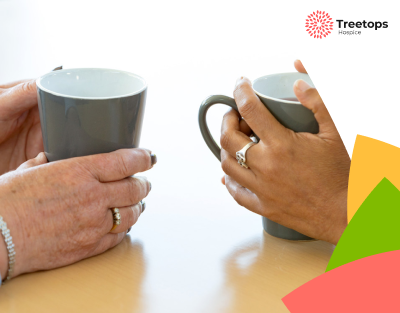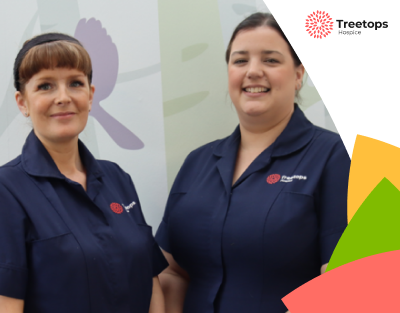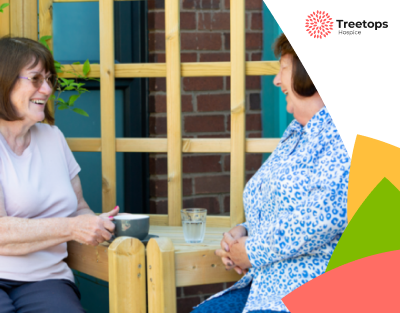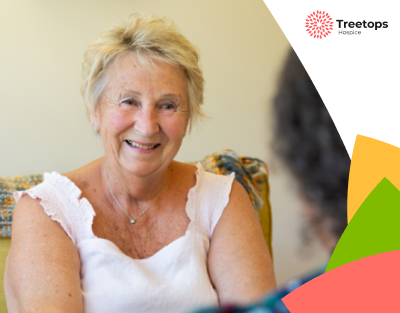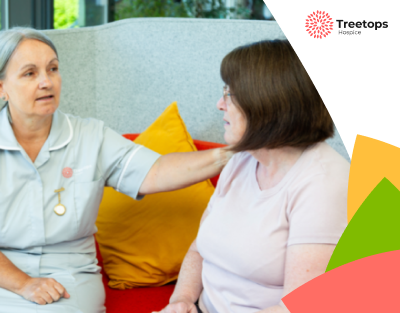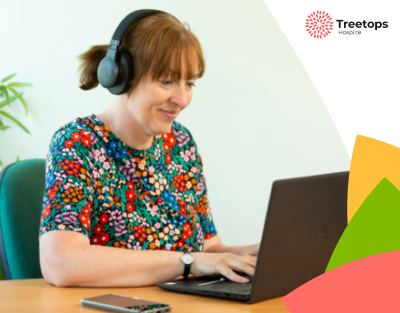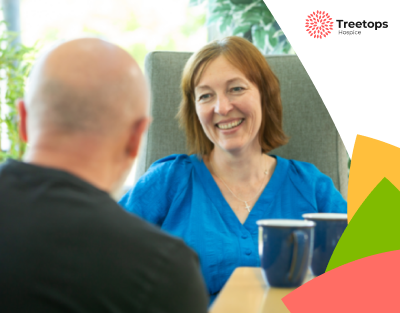
Your Questions Answered
Hospice Care
What is a hospice? Who do we care for? When should I contact my hospice? We answer a range of common questions about caring for local people and their families.
Every hospice is different. Most hospices originate from people in a local community who shared a passion about providing care for people at end of life when this wasn’t available at that time.
Treetops Hospice provides nursing care and emotional support for local people with life-limiting conditions, those who’ve been bereaved, and their families and carers.
Most hospices are charities. So, we rely on support from our local communities to help us raise money and then to deliver care for people.
Listen to our Director of Care talk about “what is a hospice?“
People may have had their ongoing care from the NHS for many years.
There comes a time when the NHS system can’t cure somebody or make them better. So, the patient is then living with a condition or illness which will limit the amount of life they’ve got left to live.
Hospices are there when ongoing treatment is no longer an option for people.
At Treetops Hospice, we help people to think about how to live what’s left of their life in the best possible way, and how to get the most out of the time that they have left.
We can help patients to manage their symptoms and help them find the best use of the time that they have each day, to achieve the things they want to achieve.
The NHS is there to try and treat and cure, and hospices are there to try and support and enable.
Listen to our Director of Care talking about the difference between a hospice and a hospital.
Each person’s life is different. The things that are around them, the people around them, and what’s important to them, is all different.
At Treetops Hospice, we try to provide an individual focus and individual plan to suit each person. We’re not here to tell people how to live their lives. We’re here to enable them to live the best possible life they can, with the time that they have left.
Listen to our Director of Care talk about how we personalise hospice care.
Originally, hospices did focus support on people with incurable cancer. Many years ago, it was difficult to access good end of life care and to help people manage the symptoms and complexities that come with cancer.
reatment today is significantly different. Most people who have cancer at some point in their life, are treated to a point where they’re cancer free, and they’re getting on with their lives.
So, hospices have evolved to use their expertise and knowledge to support people who are end of life.
At Treetops, we support people who have cancer, and we also care for patients who have heart disease, respiratory disease, long term conditions like dementia, neurological conditions such as Huntington’s Disease, and people that are living with frailty.
We offer support to anybody who knows that their life is coming towards a natural end.
Listen to our Director of Care talk about how hospice care is for those living with a life-limiting illness.
Not at all. Hospices are actually very warm and welcoming.
Yes, it’s a place where we have some difficult conversations and where we can talk about subjects that people often find very difficult.
Treetops Hospice are here to help people work through difficult feelings and feel empowered and enabled.
As a result of that, it becomes a very upbeat and positive place.
We always welcome people to visit us and see for yourself. A conversation over a cup of tea and a piece of cake could make all the difference to your life.
Listen to our Director of Care talk about how hospices aren’t sad places.
We are here to support people right from that early stage when they are given news that that their life might not be as long as they thought it was going to be and have a lot of questions.
We’re here to try and answer those questions. We might not know the answer to every question that you have. But we will endeavour to work with you to find the answers and to make sense of it.
Our team are there at every step of the way when a patient needs us. That includes being able to provide care at the end of someone’s life and being there for their family and loved ones as they deal with death and grief.
Listen to our Director of Care talk about how we’re here to support people right from that early stage of their diagnosis.
Your relationship with your local hospice is a valuable one at any time. We are here and available whenever you need us.
You can come and have a conversation with us at any point. You might be newly diagnosed with a condition. Or you could have reached a point where the NHS can’t intervene or continue with treatment.
Our drop in Wellbeing Café is where you can come and have a drink and piece of cake and chat to our knowledgeable staff and volunteers.
It’s a safe space to have a conversation with us about what’s going on in your life and we can discuss how we can help you.
Listen to our Director of Care talk about whether there is a right time to think about hospice care.
We have no patient beds here at Treetops. Our focus is all about being out in people’s own homes, in their own community.
Our biggest service is our Hospice at Home team who provide end of life care in patients’ own homes for those who wish to die at home.
We also provide person-centred Wellbeing at Home care. Visits may include:
- Helping you to work on personal goals
- Recording life stories and making memory boxes
- Discussing your future care planning
- Helping your mental wellbeing
- Having a manicure, hand massage or guided visualisation
Death and dying are subjects that people find exceptionally difficult to talk about. People worry that they will upset their loved ones by talking about dying or have previously raised the subject to have it dismissed.
We try to create an environment for people to have that difficult conversation in as comfortable a way as possible. We often find that if people can start the conversation with us here, it then becomes easier for them to talk about it with their loved ones at home.
Listen to our Director of Care talk about how we help people have conversations about death and dying.
We provide all our services free of charge to our patients and families.
It costs over £15,000 a day to run Treetops. We’re not fully funded by the NHS, but we are contracted by the NHS to provide some elements of end-of-life care.
This NHS funding doesn’t actually cover the full costs of what it takes us to deliver that care. It’s about 18% of total costs.
The rest of the money that we need to deliver our services has to be raised and that’s where our local communities, businesses, sponsors, and supporters are so vital.
We raise money through charitable donations, fundraising events, our charity shops, Treetops Lottery and gifts in Wills. We also apply to grants and trusts for specific project funding.
